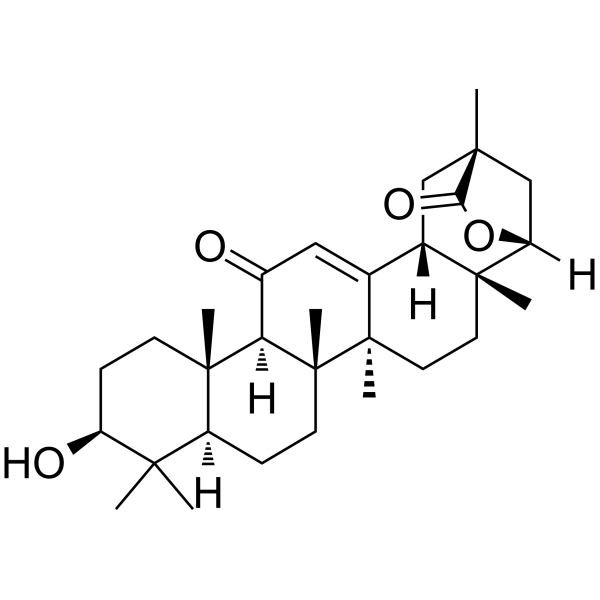
Glabrolide
CAS No. 10401-33-9
Glabrolide( —— )
Catalog No. M32690 CAS No. 10401-33-9
Glabrolide, derived from Glycyrrhiza uralensis Fisch., is a β-secretase 1 (BACE-1) inhibitor.
Purity : >98% (HPLC)
 COA
COA
 Datasheet
Datasheet
 HNMR
HNMR
 HPLC
HPLC
 MSDS
MSDS
 Handing Instructions
Handing Instructions
| Size | Price / USD | Stock | Quantity |
| 5MG | 649 | Get Quote |


|
| 50MG | Get Quote | Get Quote |


|
| 100MG | Get Quote | Get Quote |


|
Biological Information
-
Product NameGlabrolide
-
NoteResearch use only, not for human use.
-
Brief DescriptionGlabrolide, derived from Glycyrrhiza uralensis Fisch., is a β-secretase 1 (BACE-1) inhibitor.
-
DescriptionThere is a growing demand for plant based medicines, health products, pharmaceuticals, food supplements, cosmetics etc. Glycyrrhiza glabra used as mild laxative, anti-arthritic, antiinflammatory,anti-biotic, anti-viral, anti-ulcer, memory stimulant (being MAOinhibitor), anti-tussive, aphrodisiac, anti-mycotic, estrogenic, anti- oxidant, anti-caries agent, anti-neoplastic, anti-cholinergic, anti-diuretic, hypolipidemic agent. It is reported to contain important phytoconstituents such as glycyrrhizin, glycyrrhizinic acid, glabrin A&B, glycyrrhetol, Glabrolide, isoGlabrolide, isoflavones,coumarins, triterpene sterols.
-
In Vitro——
-
In Vivo——
-
Synonyms——
-
PathwayOthers
-
TargetOther Targets
-
Recptor——
-
Research Area——
-
Indication——
Chemical Information
-
CAS Number10401-33-9
-
Formula Weight468.67
-
Molecular FormulaC30H44O4
-
Purity>98% (HPLC)
-
Solubility——
-
SMILES——
-
Chemical Name——
Shipping & Storage Information
-
Storage(-20℃)
-
ShippingWith Ice Pack
-
Stability≥ 2 years
Reference
molnova catalog



related products
-
TD-165
TD-165 is a PROTAC-based cereblon (CRBN) degrader comprising a?CRBN?ligand binding group, a linker and a?VHL binding group.
-
Activated Protein C ...
Activated Protein C (390-404), human is a peptide of the activated protein C (a vitamin K-dependent serine protease), potently inhibits APC anticoagulant activity.
-
Pentacosanoic acid
Pentacosanoic acid belongs to the class of organic compounds known as very long-chain fatty acids.



 Cart
Cart
 sales@molnova.com
sales@molnova.com


